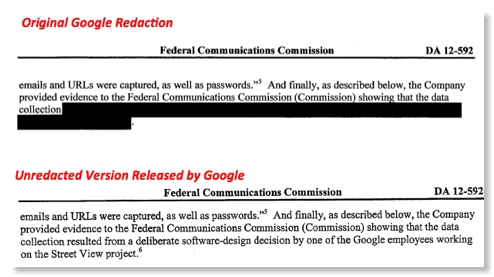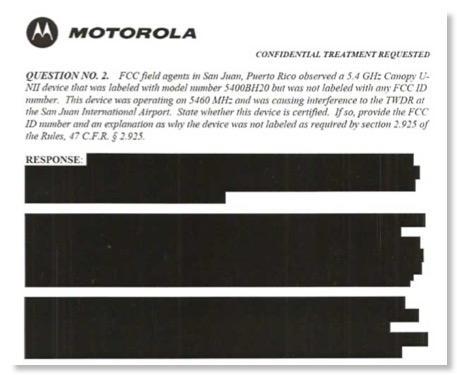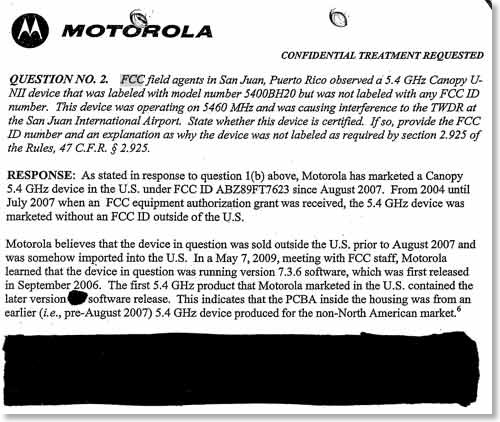FOIA Practice @ FCC: Is FCC Consistently Over-redacting?

Here we see that FCC initially accommodated Google’s request to redact a phrase because it was “proprietary”, but the unredacted text later released by Google when public pressure was too great shows that what was involved was not proprietary information covered by FOIA Exemption 4, rather it was just wrongdoing that was embarrassing to Google.
Recently, FCC finally issued an Order on your blogger’s appeal of Motorola’s redaction of a letter they sent FCC in response to questions about interference to safety-related weather radars that was caused by Motorola equipment. (Motorola has since sold the division involved.)
Original Motorola Redaction Initially Upheld by FCC Staff

Redaction After FCC 9/12 Order

Motorola insisted throughout this struggle that the whole response to the above Question 2 was subject to FOIA Exemption 4. As in the Google case, readers might want to contemplate if Motorola had any rational justification to say that the 2 paragraphs now (mostly) unredacted was really "trade secrets and commercial or financial information obtained from a person [that is] privileged or confidential" or was it just embarrassing?
The new FCC Order stated that two sections of the Motorola letter in question remain completely redacted. In view of the information revealed in the above lesser redaction, one wonders if those redactions are really proper. Is FCC just too ready to accept corporate request for redactions without making real public interest determinations?
Your blogger intends to appeal the 9/12 Order and would welcome any pro bono legal help in such an appeal.
FCC FOIA processing has had some criticism from the right wing recently. The Daily Caller recently had an article entitled “FCC FOIA denial rates higher than CIA for ‘records not reasonably described’” based on numbers recently revealed by Florida House Republican Mario Diaz-Balart. Raw data is available at 2011 FCC FOIA report.
reason.com alleges
“What's the quickest way to get a FOIA request returned by the FCC? Try asking it for information about a political enemy of the Obama administration.”
In less than a month Citizens for Responsibility and Ethics in Washington — a group funded in part through the philanthropy of left-wing billionaire investor George Soros — obtained 233 pages of records on Rupert Murdoch and his News Corp. media empire, from between Jan. 1, 2006 and July 15, 2011, according to documents available on CREW’s Scribd account.
It appears that FCC is more protective about Google and Motorola than Rupert Murdoch.
UPDATE
Our friends at CommLawBlog now have a post on this issue entitled “FOIA Request Turns Up Info on Non-FCC-Compliant Transmitters”. Here are some quotes:
Because the transmitter operated outside its FCC-certified frequency range (among other problems), the FCC determined it did not qualify for unlicensed operation, and so fined AT&T for not having a license – even though AT&T could not have obtained a license for that service. Our friend Michael Marcus, a spectrum-savvy engineer (and former FCC official), asked a different question: how did the transmitter get to be operating on a non-certified frequency? Where most of us would be content to mull this over in our idle hours (if it occurred to us at all), Marcus is made of different stuff. He not only took the question to the highest reaches of the FCC, but managed to get some answers….
The mystery continues, as does occasional interference to airport radars. Users of the Canopy transmitters have no easy way to check the operating frequency or the presence of DFS capability. But those within the U.S. can – and should – look for an FCC ID number on the unit. If the number is missing, the user is on notice that the device is not only unlawful, but also a potential threat to air safety. For the sake of all air travelers, please turn it off



![Validate my RSS feed [Valid RSS]](valid-rss-rogers.png)

